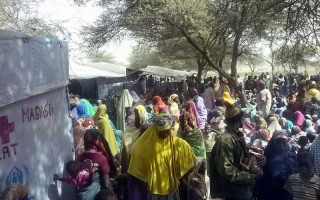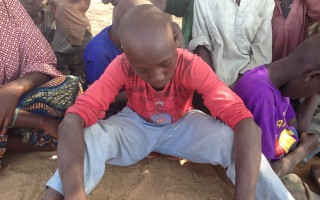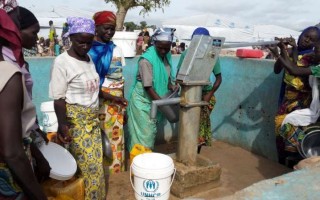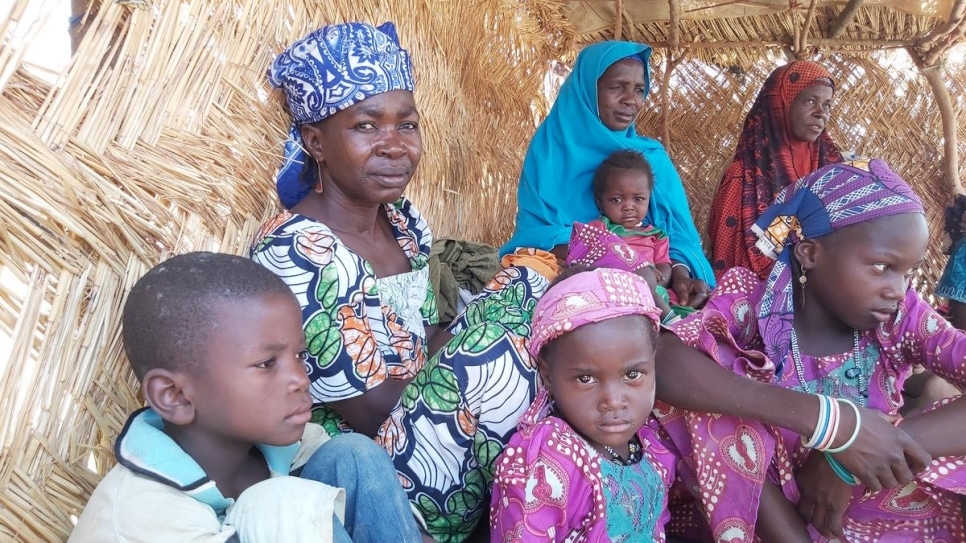
Habsou is looking after her sister’s children after she died giving birth during their flight. The baby also died. © UNHCR/Sélim Meddeb Hamrouni
UNHCR steps up activities, despite COVID-19, to assist Niger as new influx in April takes total figure to over 60,000.
As soon as they heard the first gunshots, Habsou and her sister Mariama* grabbed their children and ran for their lives.
“When the bandits arrived, I saw them with my own eyes,” Habsou said, recalling the attack last month on her home village of Gangara, one of the hardest hit in an upsurge of violence in north-western Nigeria which has forced 23,000 to flee in April alone.
Mariama was heavily pregnant and did not survive the hard 24-hour trek by foot to safety in neighbouring Niger.
“My sister’s delivery started… she did not survive.”
“While we were still in Nigeria, my sister’s delivery started… she did not survive. Her baby boy was alive. We took him with us. But he was weak. Eight days after we arrived here, he was taken to a health centre, but he died a few days ago,” Habsou said sadly.
Giving a cup of cloudy water to the youngest of nine children – five her own, four of her sister – she is now looking after, she recounted her tale quietly, her eyes full of emotion and determination: “It’s extremely painful, the worst ordeal of my life, and there’s nothing I can do.”
UNHCR, the UN Refugee Agency reported last week that 47 people were killed in one of the deadliest attacks by gunmen in Kankara town (Katsina state) and the nearby villages of Danmusa and Dusi-ma. In addition 22 villagers were killed on April 1 in Gangara, Sokoto State, according to the local police. The Nigerian Armed Forces have responded to the latest wave of attacks in Nigeria’s Katsina, Sokoto and Zamfara states with air strikes.
An estimated 23,000 refugees have fled extreme violence in northwestern Nigeria since April, the @UN reports.
▪️Most of the people fleeing are women and children
▪️The number of refugees fleeing to Niger has nearly tripled from last year pic.twitter.com/s6NyoMol3Z— AJ+ (@ajplus) May 13, 2020
Last month alone UNHCR says some 23,000 people fled the upsurge in violence taking to 60,000 the number who have fled in the last year ongoing attacks by armed groups in the Sokoto, Zamfara and Katsina states of Nigeria. As a result of the cross-border insecurity, an additional 19,000 Niger nationals are also now displaced in their own country.
UNHCR is extremely concerned about the deteriorating situation.Those fleeing speak of extreme violence unleashed against civilians, murders, kidnappings for ransom and pillaging and looting of villages.
“The situation in the region is a cause for concern, particularly in view of the rise of criminal groups operating in Nigeria. This is the whole point of UNHCR’s presence in the region,” said Alessandra Morelli, UNHCR Representative in Niger. “We have opened a sub-office in Maradi to better coordinate the emergency response at the local level and to better protect people forced to flee the violence. The essence of our mandate is proximity.”
“We have lost everything.”
New arrivals are in urgent need of water, food and access to health services, as well as shelter and clothing. Like Habsou, many were unable to take any belongings with them.
“We have lost everything. I don’t know what happened to our husbands. Until today I have no news,” added Habsou.
Habsou, like many other residents of Gangara, has taken refuge in Garin Yahaya, a village located 15 km from the Nigerian border in the Maradi region of Niger.
A village of narrow streets and banco (earth) houses, it is now full to bursting point. Since the beginning of April, its 3,300 inhabitants have welcomed around 2,500 fellow Hausa-speaking relatives. Every courtyard is crammed with dozens of people, mainly women and children, taking refuge from temperatures which can exceed 45 degrees.
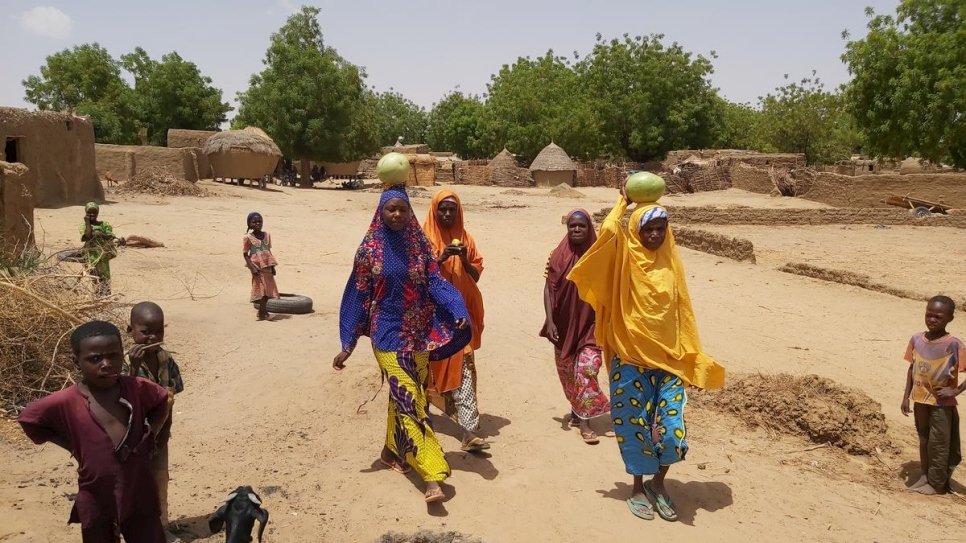
Nigerian refugee women and relatives in Niger in the village of Garin Yahaya where they have found safety. © UNHCR/Sélim Meddeb Hamrouni
Everyone’s eyes speak of hunger, tiredness and anxiety. At this rate, the village’s food stocks will not last long.
“Right now, we would like to have food, shelter but … we just hope for peace and tranquillity so that we can return home,” said Maigari Abara-Gangara, the refugees’ leader.
A tall, skinny man, wearing a large straw hat, he recounted in detail the attack on Gangara, normally home to some 5,000 people.
“On 1 April, at the late afternoon prayer time several hundred unidentified men armed with guns attacked the village. They entered on foot and fired on the young men, those who could resist. The bandits were killing, burning and looting. They set fire to the granaries that held our food stocks,” he said.
Similar attacks have taken place all over the three states, triggering the latest influx to Niger. But the “bandits” are also making incursions there, causing local populations to abandon homes and flee for their lives.
On May 10, they attacked a village only eight kilometres from Garin Yahaya to steal cattle. They were caught by a patrol of Nigerian security forces on their way back to Nigeria. A clash erupted and two civilians were shot and injured.
The refugees from Nigeria were allowed to seek protection in Niger despite border closures due to COVID-19. Now, UNHCR is working closely with authorities in Niger to relocate at least 7,000 refugees to safety and provide water, food, shelter, access to health and other essential support.
“We provide protection and access to basic services such as health, education and access to water. UNHCR, as part of the United Nations system, is also working with the Niger authorities to relocate refugees to ‘villages of opportunity’ far from the border, to ensure their safety and ease the pressure on the host population,” Morelli added.
*Full names withheld for protection reasons
Originally published on UNHCR on 19 May 2020



